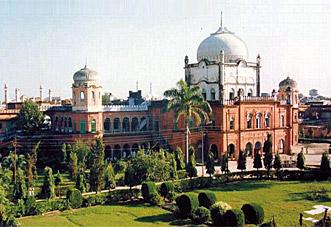 The Darul Uloom Deoband is an Islamic school that aims to teach Deobandi Islamic movement. The school is located at Deoband, a town in Uttar Pradesh. Darul Uloom Deoband was founded in 1866 by several well-known ulema, headed by Al-Imam Muhammad Qasim Nanautawi. The other prominent founding scholars of Darul Uloom Deoband were Maulana Rashid Ahmed Gangohi and Haji Syed Abid Hussain. The institution is established not only in India, but also in other parts of the Indian Subcontinent.
The Darul Uloom Deoband is an Islamic school that aims to teach Deobandi Islamic movement. The school is located at Deoband, a town in Uttar Pradesh. Darul Uloom Deoband was founded in 1866 by several well-known ulema, headed by Al-Imam Muhammad Qasim Nanautawi. The other prominent founding scholars of Darul Uloom Deoband were Maulana Rashid Ahmed Gangohi and Haji Syed Abid Hussain. The institution is established not only in India, but also in other parts of the Indian Subcontinent.
The scholars at Darul Uloom Deoband were contravening the idea of establishment of a religious government and had opposed the demands of Muslim League led by Jinnah too. Mohtamim or principal of Darul Ulum Deoband, Maulana Husain Ahmad Madani led the Jamiat-i-Ulema-i-Hind, the most influential organization of the Ulema. He saw nothing Islamic in the idea of Pakistan. According to him, all should make an effort jointly for such a democratic government in which Hindus, Muslims, Sikhs, Christians and Parsis are included. Such a freedom is in harmony with Islam. The school, even though it advocates an orthodox story of Islam, has frequently moved itself away from religious militancy.
In 1857, the British East India Company put down independence movement by dissimilar north Indian forces, prepared in the name of the otherwise powerless Bahadur Shah Zafar. Emperor Zafar became the last Mughal Emperor, for he was deposed the following year and banished to Burma, with many of his sons, princes of the debauched dynasty, he was put to death. This marked a significant phase in the Indo-Islamic consciousness, particularly for the familiar Muslim wealthy class of north India, who thought 1857 as the end of their political ascendancy and the beginning of what could be a dark period of Muslim history in India.
In this situation, a group of learned theologians, lead by Maulana Muhammad Qasim Nanautawi, established the Darul Uloom Seminary in the town of Deoband, north of Delhi, in order to protect and train the youth with the necessary Islamic knowledge. The academic philosophy of Deoband was based on teachings that revealed Islamic sciences, known as manqulat. The education was bestowed the Indian Muslim population, following in the Hanafi tradition. In this university, Nanautavi instituted modern methods of learning, enormous classrooms, carefully selected curriculum, learned faculty for different subjects, exam periods, prizes, a publishing press and so on. He deliberately decided to keep it aloof from political or governmental participation. Instead, the faculty instructed its students mainly in Urdu, which was the lingua franca of the urbanized section of the region, and supplemented it with study of Arabic (the storehouse of Muslim theology) and Persian (the head of Indian Muslim culture); in due course, it also unintentionally sanctioned the growing association of the Urdu language with the (north) Indian Muslim community.
 Over 15,000 graduates have passed out from Darul Uloom Deoband and have gone on to higher foundations to spread their knowledge. Darul Uloom Deoband`s curriculum is based on the 17th-century Indo-Islamic syllabus known as Dars-e-Nizami. The basic curriculum teaches Islamic jurispridence (Fiqh), Islamic law or shariah, traditional Islamic theology (known as tasawwuf, which is the practice of Sufism), as well as several other aspects of Islamic study. The current syllabus consists of four stages, where the first three stages can be completed in a total of eight years. The final stage is a post-graduate stage where students focus in a number of advanced topics, such as the sciences of Hadeeth, Fiqh and so on.
Over 15,000 graduates have passed out from Darul Uloom Deoband and have gone on to higher foundations to spread their knowledge. Darul Uloom Deoband`s curriculum is based on the 17th-century Indo-Islamic syllabus known as Dars-e-Nizami. The basic curriculum teaches Islamic jurispridence (Fiqh), Islamic law or shariah, traditional Islamic theology (known as tasawwuf, which is the practice of Sufism), as well as several other aspects of Islamic study. The current syllabus consists of four stages, where the first three stages can be completed in a total of eight years. The final stage is a post-graduate stage where students focus in a number of advanced topics, such as the sciences of Hadeeth, Fiqh and so on.
Most of the participants in the Indian independence included graduates of Darul-Uloom, Deoband. The Darul Uloom Deoband has countless alumni members and the Deoband School of Islamic Sciences has been producing great scholars across the globe years after years. It rose to become the most prestigious institution in the late 18th and early 19th centuries. Some of the notable alumnus
Darul Uloom Deoband is as follows:
| Shaykh ul Hind Maulana Mehmood Al-Hasan | Hakeem ul Ummah Maulana Ashraf Ali Thanwi | Qari Tahir Qasmi |
| Imam Al-Asar Allamah Anwar Shah Kashmiri | Qari Muhammad Tayyeb Qasmi | Maulana Khurshid Sahib |
| Mufti Muhammad Shafi (Mufti-e-Azam Pakistan) | Maulana Muhammad Ilyas Kandhelvi | Maulana Mufti Zain ul Abideen (Faisalabad,Pakistan) |
| Allamah Syed Muhammad Yusuf Binori | Maulana Muhammad Idris Kandhlavi | Maulana Ubaidullah Sindhi |
| Shaykh Ul-Islam Allamah Shabbir Ahmad Usmani | Maulana Syed Manazir Ahsan Gilani | Maulana Badr Alam Merathi |
| Mufti Kifayatullah | Maulana Syed Abul Hasan Ali Nadwi | Muhaddis-E-Asar Maulana Anzar Shah Kashmiri |
| Maulana Ahmad Ali Lahori | Mufti Muhammad Hasan Amritsari | Qazi Habib-ur-Rehman (Haripur) |
| Shaykh ul Islam Maulana Husain Ahmed Madani | Maulana Mufti Rasheed Ahmad (Karachi, Pakistan). | Maulana Salim Qasmi |




















